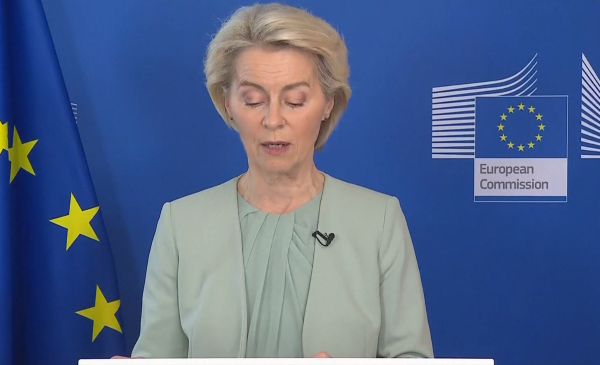The European Commission is stepping up moves to ban imports of Russian liquefied natural gas in a new set of sanctions on Moscow’s invasion of Ukraine, according to an EU official.
The latest move follows Tuesday’s call between U.S. President Donald Trump and European Commission head Ursula von der Leyen. Washington is pressing Europe to do more to help end the war in Ukraine, given the failure of peace efforts so far in face of repeated threats that harsher penalties will be exacted on Moscow and its partners.
Trump wants an end to all Russian oil purchases by European nations and is also urging the EU bloc to impose tariffs on China and India since they are major buyers of Russian fossil fuels. He is also calling on the Group of Seven nations (G7) and NATO, which includes Russian oil buyer Turkey among its members, to do likewise.
As is, the EU is aiming to phase out all imports of Russian oil and gas by 1 January 2028, while a ban on short-term contracts due to take effect beginning next year.
The new sanctions, the 19th package of EU sanctions against Russia since the start of its war with Ukraine, is being presented to member states today, after a week-long delay to accommodate a top-level EU delegation’s Washington visit and enhanced coordination measures. The proposal addresses several key targets, including financial institutions, 118 vessels associated with the shadow fleet, and, for the first time, cryptocurrency platforms utilized by Moscow for laundering transactions within the global financial market. Earlier this year, the EU banned Russian LNG trans-shipments at EU ports, putting aside plans to sanction LNG imports outright.
Some 19% of Europe’s gas supply continues to come from Russia via the TurkStream pipeline and LNG shipments. Pre-2022, the share was roughly 45%.
Spain, Belgium, the Netherlands and France import Russian LNG. Slovakia, Hungary and Bulgaria rely on gas from the TurkStream pipeline, the sole pipeline carrying Russian gas to Europe since suspected sabotage-related blasts shut down the Nord Stream 1 pipeline in September 2022.
In the past week, the CEO of the French energy giant TotalEnergies, Patrick Pouyanne, said they would require Russian gas until the end of 2027, by which time “we can source it from other places without impact on the price.”

